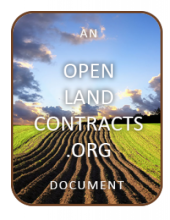Land Library
Welcome to the Land Portal Library. Explore our vast collection of open-access resources (over 74,000) including reports, journal articles, research papers, peer-reviewed publications, legal documents, videos and much more.
/ library resources
Showing items 1 through 9 of 803.Matters of environmental migration are frequently looked at from a humanitarian perspective.1 This policy brief will instead look at it with a lens focusing on land issues. The question of environmental migration is inevitably linked to the question of land for several reasons.
Over the past 20 years, the term "agro-ecological zones methodology," or AEZ, has become widely used. However, it has been associated with a wide range of different activities that are often related yet quite different in scope and objectives.
This is a Model Contract posted on OpenLandContracts.org. It lists Other crops as the primary resource(s)
This is a Model Contract posted on OpenLandContracts.org. It lists Other crops as the primary resource(s)
The researchers have used evidence from Mato Grosso, Brazil, to show that changes in agricultural output stemming from the sensitivity of cropland area and cropping frequency to interannual climate variability are of similar magnitude to agricultural output changes associated with the sensitivity
The purpose of this study was to determine the financial cost of irrigation water in the Jordan Valley and the corresponding impact of higher water prices on farming. The analysis shows that JVA needs significant tariff increases to be able to attain a more financially sustainable footing.
Results demonstrate that the effects of management on cropland can be beneficial for carbon and nutrient retention without risking (large) yield losses.
The report's main objective is to provide key lessons from the sustainable urban tourism project through the analysis of different enabling conditions and obstacles that determined the course and the final outcome of the initiative.
In Senegal, concern about large-scale land acquisitions has been growing since 2000. Senegalese agriculture has long relied on small-scale family holdings and extensive agriculture.





